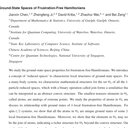The effects of allitridi and amiodarone on the conduction system and reverse use-dependence in the isolated hearts of rats with myocardial infarction.
Anahtar kelimeler
Öz
BACKGROUND
Allium sativum L. (DaSuan in Mandarin) is a traditional Chinese herb that has been used to prevent and heal cardiovascular diseases.
OBJECTIVE
To study the effects of allitridi (an active constituent of Allium sativum L.) and amiodarone on the conduction system and on reverse use-dependence in the isolated hearts of normal rats and rats with myocardial infarction (MI).
METHODS
Male Sprague Dawley rats, with a ligated left anterior descending coronary artery, were used as myocardial infarction models to investigate the biological effects of the traditional Chinese herb. A single-phase electrode assay and isolated heart perfusion administration methods were employed to study and compare the electrophysiological effects of allitridi and amiodarone on normal and MI rats. Monophasic action potential (MAP) in vitro, effective refractory period (ERP) and monophasic action potential duration (MAPD)/ERP were measured to investigate reverse use-dependence (RUD) with allitridi and amiodarone. Moreover, bundle maps and heart rates were analyzed to evaluate the electrophysiological effects of allitridi on the conduction system of the cardiac muscles. Coronary flow was used to study the beneficial effects of the two drugs on the bundle of His in myocardial infraction.
RESULTS
(1) Allitridi and amiodarone can reduce the infarction model of the His bundle (A-H, H-V) conduction and cardiac sinus rhythm in normal rats and isolated rat hearts. After washing in physiological solution (AK-H) for 15 min, the allitridi group partially recovered, but the amiodarone group did not recover. (2) Allitridi and amiodarone had no significant effects on the change of MAPD(90) or ERP in normal and MI rat hearts at different pacing frequencies (200, 250 and 300 beats/min), which indicated no RUD. In addition, the effects of allitridi on prolonging MAPD(90) and ERP were weaker than those of amiodarone (P<0.01). The effects of allitridi on myocardial repolarization and its variation rate were also weaker than those of amiodarone (P<0.01). However, the prolonged administration of allitridi still did not cause RUD. Allitridi and amiodarone can significantly increase the ERP/APD(90) rate of the isolated heart ventricles of normal rats and rats with MI.
CONCLUSIONS
We propose that allitridi and amiodarone have similar effects on the cardiac conduction system and on the electrophysiology without RUD, which may be the result of the use of multi-channel blockers, such as calcium channel blockers and IKr and IKs channel blockers. Allitridi may be a promising antiarrythmic drug.





